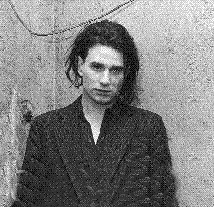  |
|
STRANGELOVE |
|
|
|
Love and other demons
|
...discography...
Strangelove produced the following music during their short-lived but wonderful career.
time for the rest of your life
released:
Aug. -94
Sixer.
Time For The Rest Of Your Life.
Quiet Day.
Sand.
I Will Burn.
Low-Life.
World Outside.
The Return Of The Real Me.
All Because Of You.
Fire (Show Me Light).
Hopeful.
Kite.
Is There A Place?
love and other demons
released: June -96
Living With The Human Machines.
Beautiful Alone.
Sway.
20th Century Cold.
She's Everywhere.
#1432.
Casualties.
Spiders And Flies.
Elin's Photograph.
The Sea Of Black.
strangelove
released: October-97
Superstar.
Freak.
Someday Soon.
Wellington Road.
The Runaway Brothers.
Another Night In .
The Greatest Show On Earth.
Little Queenie.
She's On Fire.
Mona Lisa.
Jennifer's Song.
SINGLES
Visionary (Ser T001)
Visionary
Front
Chances
Snakes
(-92)
Hysteria Unknown (Ser T002)
Hysteria Unknown
My Dark
Walls
Sea
(-92)
Rough Trade Singles Club (45rev18)
Zoo'd Out
Circles
(-92)
Time For The Rest Of Your Life (Food49)
Time For The Rest Of Your Life
Motorpsycho Nitemare
It's So Easy
(-94)
Is There A Place? e.p. (Food55)
Is There A Place?
Sand
Nobody's There
The King of Somewhere Else
(-94 )
Living With The Human Machines (Food70)
cd.1
Living With The Human Machines
Hysteria Unknown
Chances
My Dark
cd.2
Living With The Human Machines
Mr Money Catcher
Killing Time
(21/04/96)
Beautiful Alone (Food81)
cd.1
Beautiful Alone
Visionary
Zoo'd Out
Sea
cd.2
Beautiful Alone
Wolf's Story Part I
Wolf's Story Part II
Wolf's Story Part III
(03/06/96)
Sway (Food82)
cd.1
Sway
Nowhere Days
Hold On
Ghost Haddock
cd.2
Sway
20th Century Cold (live acoustic version)
She's Everywhere (live acoustic version)
Moon River. (live acoustic version)
The Greatest Show On Earth (Food97)
cd.1
The Greatest Show On Earth
Couples
Crofters
Ascension Day
cd.2
The Greatest Show On Earth
Elin's Photograph (live acoustic)
Spiders And Flies (live acoustic)
If I Can Dream (live acoustic)
(July 14 -97)
The Freak (Food105)
cd.1
Freak
The City Song
The King Of A Real Men
cd.2
Freak
The Devil You Know
Bethlehem
(Sep 29 -97)
Another Night In (Food110)
cd.1
Another Night In
The Drinker
Measured In Blood
cd.2
Another Night In
Last Great Rock 'n' Roll Queen
Extract From A Journal: Nov 17th 1997
(Feb 2 -98)
Other Recordings
Free single
World Outside (Live)
Hysteria Unknown (Live)
Given away free at Bristol's Sound City 19/4/95
On Free Q CD "World of Noise"
Time For The Rest Of Your Life
Inside the CD cover it says:
"As catchphrases go, Patrick Duff of Strangelove's
emphatic shriek of "christ!" in Time For The Rest Of
Your Life is certainly memorable. Evoking thoughts
of Morrissey as vocally-tutored by Scott Walker, this
title track of the Bristol group's debut album was loudly
heralded Single Of The Year by Q writers."
And inside the magazine it says:
"The title track of their remarkable 1994 debut album
and the song that spawned the Strangelove catchphrase,
"Christ!". Guitarist Alex Lee: "When we played it live, a
few people said it was the best song we'd got. That's when
I began to realise that, actually, it was The Business."
Lyricist and frontman Patrick Duff: "This record sounds like
the inside of my head."
May -95 (No. 104)
Casualties - On tape free with the NME (we don't know the date)
She's Everywhere. - on "Mmmmm" CD, free with Q 118 (July 1996)
howling under the moon of love (Wolfs Story)Purr 2 compilation
(10" split with Tinderstick,Breed & God
Machine)
Zoo'd Out. - on Volume 4 compilation, August 92
Zoo'd Out. - on "Sharks Patrol These Waters", best of Volume, 1995
Time For The Rest Of Your Life - on Parlophone "A flavour of the label" sampler No.1
Beautiful Alone - on Parlophone "A flavour of the label" sampler No.6
Sway - on Parlophone "A flavour of the label" sampler No.7
return to index
 released June -96
released June -96